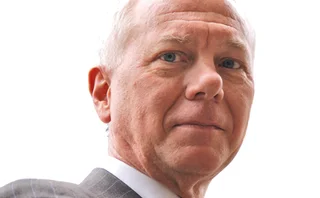
What is normal?

Economic theory places much faith in the perfect market, which is free from external impulses, where all participants behave rationally and there are no barriers to entry. Sadly for academics, the real world intrudes and shreds economic theories based on the perfect market, which has proved to be an illusion.
Moves by pension funds and insurers at the tail-end of last year to hedge their interest rate exposures as central banks around the world slashed rates resulted in volatile pricing. If the multi-trillion euro bond market can be moved by individual players, how deep does a market need to be if it is to be described as truly liquid?
The interaction between theory and reality has led to economics being dubbed the "dismal science", with President Truman famously requesting a council of uni-limbed economists to advise him as he was fed up of being given economic prognoses that started, "on the one hand it... .....".
It is easy to see this trend in action today - if you type "future of the global economy" into Google you will receive nearly 50 million results, and almost just as many opinions as experts trying to turn theory into reality with the safety net of knowing that opinions rarely have consequences.
Those struggling with managing the financial system don't have the luxury of making harmless mistakes, and just as economists have struggled with extrapolating the real world from the perfect market, regulators have seen reality intrude on market consistency.
As a flight to quality developed, the risk-free rate was distorted - which in Denmark has resulted in alterations to the discount rate (Regulator Q&A, p10). While in the Netherlands, the Dutch government has relaxed constraints on recovery plans used by pension schemes looking to rebuild shattered balance sheets (news page 9).
The overwhelming reaction from industry to these moves - and others, such as last month's relaxation by German regulator Bafin of equity stresses on insurers' balance sheets - has been positive with regards to the way regulators have responded to requests to alter the system to match prevailing realities. But all these moves have been based on one assumption - things will return to normal, maybe not this year, or next year, but soon.
The as-yet-unanswered question is how regulators will react if instead of returning to the mean, markets simply create a new mean - one where rock bottom interest rates and low equity returns are the norm. Will regulators still retain the ability to change their approach in the face of market realities?
One institution that has also changed during this period of market turmoil is Life & Pensions itself. Founding editor Nicholas Dunbar is off writing a book on the origins of the credit crunch and I have stepped up from the deputy editor role. It is clearly an exciting time to be in financial journalism, and I look forward to keeping you abreast of all the latest developments in the market.
Please feel free to contact me with any comments or suggestions at aaron.woolner@incisivemedia.com.
Only users who have a paid subscription or are part of a corporate subscription are able to print or copy content.
To access these options, along with all other subscription benefits, please contact info@risk.net or view our subscription options here: http://subscriptions.risk.net/subscribe
You are currently unable to print this content. Please contact info@risk.net to find out more.
You are currently unable to copy this content. Please contact info@risk.net to find out more.
Copyright Infopro Digital Limited. All rights reserved.
As outlined in our terms and conditions, https://www.infopro-digital.com/terms-and-conditions/subscriptions/ (point 2.4), printing is limited to a single copy.
If you would like to purchase additional rights please email info@risk.net
Copyright Infopro Digital Limited. All rights reserved.
You may share this content using our article tools. As outlined in our terms and conditions, https://www.infopro-digital.com/terms-and-conditions/subscriptions/ (clause 2.4), an Authorised User may only make one copy of the materials for their own personal use. You must also comply with the restrictions in clause 2.5.
If you would like to purchase additional rights please email info@risk.net
More on Economics
Global investment outlook: 2026 and beyond
Broadening, steepening and weakening: Franklin Templeton’s top investment ideas for 2026 and beyond
Webinar – Nowcasting the US economy
Join CME Group Chief Economist, Blu Putnam, as he shares insights using alternative data and nowcasting to monitor developments in the US economy.
Fed Funds Futures in a Post-ZIRP World
As the FOMC returns to more active management of its key target rate, Federal Funds futures have experienced dramatic growth.
Challenging economic pessimism: an optimistic note
A contrarian, upbeat view of the long-term economic outlook
Economists, like hedge fund traders, need open minds
Economists, risk managers and traders must learn the lessons of crisis, says Kaminski
Fed wrong not to start QE tapering, says UBS economist
The surprise decision by the Federal Reserve last month not to scale back its quantitative easing programme will create more volatility, says economist







